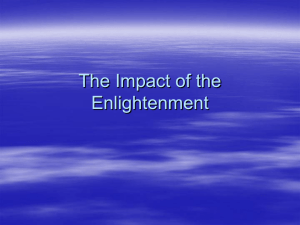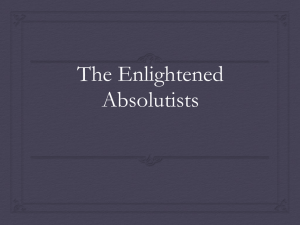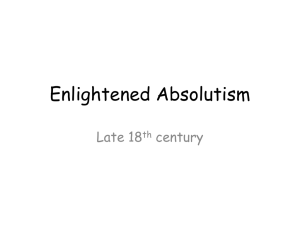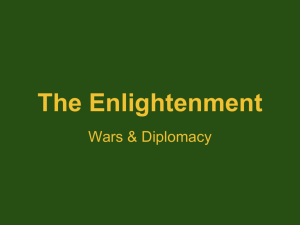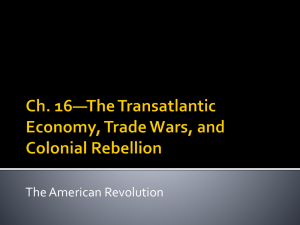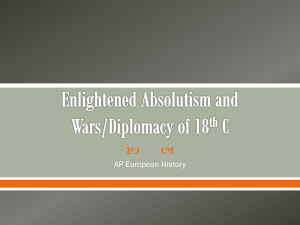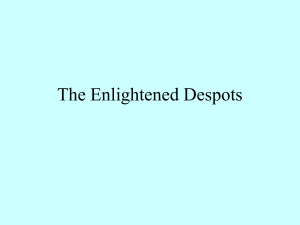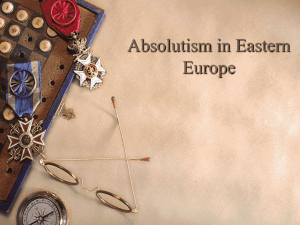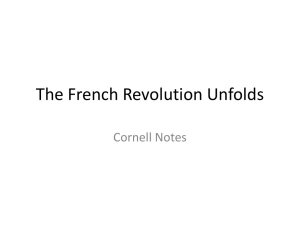Notes: Enlightened Absolutism
advertisement
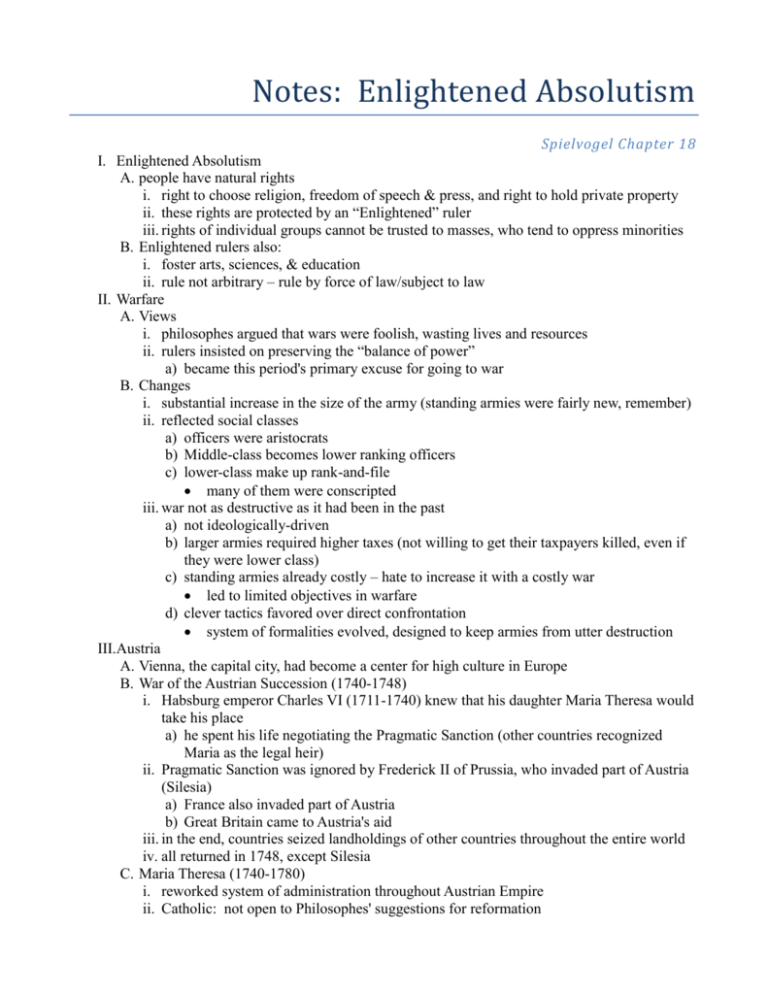
Notes: Enlightened Absolutism Spielvogel Chapter 18 I. Enlightened Absolutism A. people have natural rights i. right to choose religion, freedom of speech & press, and right to hold private property ii. these rights are protected by an “Enlightened” ruler iii. rights of individual groups cannot be trusted to masses, who tend to oppress minorities B. Enlightened rulers also: i. foster arts, sciences, & education ii. rule not arbitrary – rule by force of law/subject to law II. Warfare A. Views i. philosophes argued that wars were foolish, wasting lives and resources ii. rulers insisted on preserving the “balance of power” a) became this period's primary excuse for going to war B. Changes i. substantial increase in the size of the army (standing armies were fairly new, remember) ii. reflected social classes a) officers were aristocrats b) Middle-class becomes lower ranking officers c) lower-class make up rank-and-file many of them were conscripted iii. war not as destructive as it had been in the past a) not ideologically-driven b) larger armies required higher taxes (not willing to get their taxpayers killed, even if they were lower class) c) standing armies already costly – hate to increase it with a costly war led to limited objectives in warfare d) clever tactics favored over direct confrontation system of formalities evolved, designed to keep armies from utter destruction III.Austria A. Vienna, the capital city, had become a center for high culture in Europe B. War of the Austrian Succession (1740-1748) i. Habsburg emperor Charles VI (1711-1740) knew that his daughter Maria Theresa would take his place a) he spent his life negotiating the Pragmatic Sanction (other countries recognized Maria as the legal heir) ii. Pragmatic Sanction was ignored by Frederick II of Prussia, who invaded part of Austria (Silesia) a) France also invaded part of Austria b) Great Britain came to Austria's aid iii. in the end, countries seized landholdings of other countries throughout the entire world iv. all returned in 1748, except Silesia C. Maria Theresa (1740-1780) i. reworked system of administration throughout Austrian Empire ii. Catholic: not open to Philosophes' suggestions for reformation D. Joseph II (1780-1790) i. son of Maria Theresa ii. continued expanding Habsburg power in Austria iii. Enlightened monarch a) Reforms abolished serfdom gave peasants hereditary rights to their holdings (semi-successful) eliminated international trade barriers abolished death penalty complete religious toleration b) Reforms alienated nobility and the Catholic church, and even commoners example: tried making German official national language, which alienated nonGerman speakers, nobles and peasants alike c) successors undid most of his reforms his self-composed epitaph reads: “Here lies Joseph II, who was unfortunate in everything that he undertook.” IV. Louis XV (d. 1774) – France A. supposed to be the Enlightened monarch, but was strongly influence by his mistress Madame de Pompadour i. she made many of France's important government decisions V. Great Britain A. from “English”/“Scottish” to “Britains” in the United Kingdom B. Patronage – awarding of titles, posts, and positions in church & government i. deputies to the House of Commons were chosen by borough (small town) ii. no equality to how many came from each borough iii. ended up with “pocket boroughs,” where a borough was controlled by a single person a) for example: Duke of Newcastle controlled representatives of seven boroughs C. Hanoverians – when the last Stuart ruler died, the crown was offered to the rulers of the German state of Hanover. i. George I (1714-1727) & George II (1727-1760) did not speak British or understand the British system a) Duke of Newcastle handled patronage b) Robert Walpole, the prime minister, handled governmental matters D. The Seven Years' War (1756-1763) i. Maria Theresa angry because Prussia held onto Silesia (see War of Austrian Succession) a) organized a “diplomatic revolution” the Bourbons and Habsburgs resolved their differences and France allied with Austria Russia joined also, because they felt Prussia stood in their way Britain, enemy of France over colonies, joined Prussia ii. European Front a) Prussia initially did well, but began to be worn down when the ruler of Russia died Russia now withdrew its troops, leading to a stalemate b) Peace of Hubertusburg (1763) – all captured territories returned; Silesia officially recognized as part of Prussia iii. Indian Front (called the “Great War for Empire” on worldwide front) a) French and British each backed opposing Indian princes b) British won – now sole control of India per the Treaty of Paris (1763) iv. North America (called the “French and Indian War” on North American front) a) attempt to gain St. Lawrence River and the Ohio River Valley American Indians wanted it to be French, since the French were less invasive b) William Pitt the Elder (British prime minister) felt that annihilation of French colonies was necessary to pave the way for British settlement focus on naval power – keep France from supporting army in America c) British defeated Quebec by scaling cliffs d) Treaty of Paris (1763) – Great Britain gains lands east of Mississippi Great Britain also gets Canada v. major result: Great Britain became the world's greatest colonial power VI. Decline of the Dutch Republic A. rebellions by the “Patriots” calling for democratic reforms B. crushed by Orangists (rulers, remember William?) VII. Prussia A. Frederick William I (1713-1740) i. established the General Directory, which supervised all government affairs a) increased differences between socio-economic classes b) Set up the Junkers, landed aristocracy who owned large estates with lots of serfs The Junkers controlled the army and the peasants Frederick controlled the Junkers c) Peasants had no control over their lives (even had to get nobles' permission to marry) d) only way middle class could gain prestige was through civil service B. Frederick the Great (1740-1786) = Frederick II i. diligent ruler known for efficiency and honesty ii. followed philsophes' recommendations (except for abolishing serfdom – he increased class-based stratification) – Enlightened Monarch iii. enlarged army and used it in War of Austrian Succession and the Seven Years' War (not very enlightened) VIII. Russia A. Catherine the Great (1762-1796) i. German wife of Tsar Peter III, who was assassinated by nobles ii. said she wanted to be Enlightened, but worked with nobility to strengthen their position relative to peasants iii. led to very poor conditions for peasants, and even revolts in border districts iv. Cossacks: independent tribes in southern Russia – instrumental in the rebellion a) led by Emalyan Pugachev (Pugachev's rebellion – 1773) b) focused on Volga River valley, north of the Caspian Sea c) peasants seized landlords' estates, killing over 1,500 estate owners & their families d) government rallied, Pugachev captured & killed e) conditions for peasants made even poorer – end all reforms in rural areas, expand serfdom v. Catherine expanded Russian territory a) west into Poland (acquired 50%) b) south to Black Sea (required fighting Turks) IX. Goodbye for now, Poland A. three surrounding countries divided Polish state in three partitions (1791, 1792, 1795) B. see map p. 502 X. the rest of Europe A. Spain i. now with a Bourbon king (remember Wars of the Spanish Succession?) ii. had lost lands in Italy & Netherlands in Treaty of Utrecht (once again, the Wars of Succession), so now it had enough money to get by iii. Charles III (1759-1788) reduced power of Inquisition and banished the Jesuits B. Portugal i. the marquis of Pombal – ruled through several monarchs (from 1699-1782) a) reduced power of nobles & church b) once he died, things went right back to the way they were C. Scandinavia – Gustavus III (1771-1792) – Enlightened Monarch of Sweden i. est. freedom of religion, speech, press ii. no more torture iii. laissez-faire economics iv. assassinated by nobles, but they couldn't undo his reforms XI. Examining big three “Enlightened Monarchs” A. Joseph II (Austria) – truly was B. Frederick II (Prussia) – was, but loved war & class divisions too much C. Catherine (Russia) – started out, but kept nobles happy too much XII. Economic and Social Change A. Steadily increasing population i. mostly due to a decline in death rates (better food, better transportation to get food to people) ii. death still common, especially from diseases, especially those caused by poor sanitation a) incidentally – the last significant outbreak of plague occurred in 1720 in S. France B. marriage – ave. 27-28 for men; 25-27 for women (gave them time to acquire finances necessary to support a family) i. ave. five births per family in lower classes; move from 6 circa 1675 to 2 circa 1760 ii. cottage industry – everyone in the home contributed to the family economy iii. survival of children – more likely a) led to children's clothing styles, attacks on primogeniture, toys (including jigsaw puzzles), and mothers breast-feeding their own kids (even in the aristocracy) b) unfortunately, infanticide was fairly common for economic reasons more often, though, children were abandoned in foundling homes in foundling homes, mortality rates ranged from 50 to 90% survivors had to perform miserable jobs C. Agricultural Revolution! i. Increased food production a) more farmland no land lying fallow – instead planted nitrogen-replenishing crops (alfalfa, turnips, clover) enclosure – large landowners enclosed open fields/small holdings into large farms (especially popular in Britain) took land from poor farmers, who had to become wage laborers or tenants farmers – destroyed their way of life most people in this time period were rural, except in the Dutch Republic, Britain, and some of Italy b) increased yield per acre Jethro Tull (1674-1741) used a seed drill to plant (less loss to birds) constantly cultivated soil (air and moisture got to plants better) add corn and potatoes c) healthier/more livestock could eat the crops mentioned in a). More food=more animals d) improved climate – end mini-ice age of 17th century D. Financial changes i. move toward paper money (not backed by hard currency) a) allows issue of credit, especially in Great Britain E. move from cottage to factory production i. Richard Arkwright (1732-1792) – invented water frame, a water-powered spinning machine
